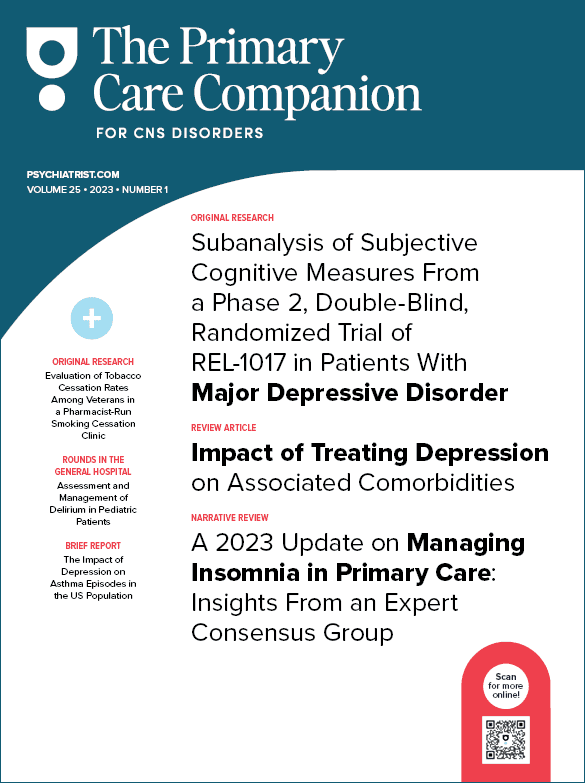Mitochondrial diseases collectively refer to conditions in which mitochondrial function is impaired and clinical symptoms are triggered by impaired energy metabolism, resulting mainly from decreased energy production.1 Mitochondrial myopathy, encephalopathy, lactic acidosis, and stroke-like episodes (MELAS) is one of the most frequently maternally inherited mitochondrial diseases. About 80% of patients with MELAS carry the mitochondrial DNA (mtDNA) A3243G mutation.
In addition to its relatively common symptoms, such as neurologic, muscular, renal, diabetic, endocrine, and cardiac symptoms, about half of patients with mitochondrial disease have psychiatric symptoms, including depression.2 Numerous reports have suggested that mitochondrial dysfunction is involved in the mechanism underlying the onset of depression3 and other psychiatric disorders.4 Although reports of mitochondrial gene abnormalities accompanied by the development of depression have been published,5 no descriptions of the perinatal onset of this condition are currently available. In this report, we describe the case of a woman with the mtDNA A3243G mutation who developed depression during the perinatal period.
Case Report
Ms A, a 30-year-old woman with a history of an A3243G mutation (37%), a mitochondrial gene abnormality, abnormal glucose tolerance, and mild hearing loss, had not developed MELAS at the time of admission. She was transferred to the psychiatric ward after being admitted to the obstetrics and gynecology ward because of severe depressive symptoms, inappetence, insomnia, and anxiety after delivering her child. Based on the Diagnostic and Statistical Manual of Mental Disorders, Fifth Edition criteria, a diagnosis of a severe depressive episode with perinatal onset was established. At admission, she exhibited a score of 27 on the 21-item Hamilton Depression Rating Scale6 and a score of 27 on the Quick Inventory of Depressive Symptoms,7 which are the most severe levels of depressive symptoms on the 2 scales, respectively. She had been unable to eat before admission and was started on supplemental infusion therapy and vortioxetine 10 mg/d. We also monitored her closely for the exacerbation of symptoms related to MELAS and reduced the risk factors for the onset of this condition.8
After her admission, she complained of intense anxiety about raising her baby and the possibility of developing MELAS. Although her depression showed a slight tendency to improve, anxiety and agitation persisted. On the seventh day after admission, the dose of vortioxetine was increased to 20 mg/d, which led to the gradual improvement of her depression. The patient had a score of 9 on the Hamilton Depression Rating Scale and 5 on the Quick Inventory of Depressive Symptoms on day 20 of hospitalization, which represented a significant improvement compared with the scores obtained at admission. The patient continued to complain of anxiety about life after being discharged, albeit within an understandable range. She was discharged home on the 46th hospital day, after arranging home nursing care and outpatient psychiatry and therapy follow-up.
Discussion
This is the first report, to the best of our knowledge, of a patient with mitochondrial dysfunction who developed severe depression following the delivery of her child. In the present case, we considered that 3 factors were associated with the onset of depressive symptoms, as follows:
(1) The perinatal period itself is a risk factor for the onset of depression.9
(2) Her mother developed MELAS after childbirth, and she had taken care of her mother since she was an adolescent; therefore, she was concerned that she might also develop the disease. This psychological factor may have affected her depressive symptoms.10
(3) Her mitochondrial function, which was initially vulnerable, was further reduced after her pregnancy, which may have contributed to the worsening of the depressive symptoms in this patient. Pregnancy has a varied effect on mitochondrial diseases, with some women remaining asymptomatic and others developing symptoms.11 During her hospitalization, there was no worsening of her hearing loss or glucose intolerance, and she did not develop any new symptoms related to MELAS.
Although vortioxetine relieved the depressive symptoms in this case, the treatment of depression caused by mitochondrial disease remains at the case report level, and no established treatment exists. Because some psychotropic drugs inhibit mitochondrial function and many of these drugs lower the life-threatening seizure threshold of patients with mitochondrial disease, case reports suggest that it is desirable to treat mitochondrial disease using nonpharmacologic interventions whenever possible.2
This case highlights the importance of closely monitoring the exacerbation of the symptoms related to MELAS and reducing the risk factors for the onset of this disease, such as cold exposure, dehydration, excessive stress, fever, and hypoargininemia.8 Further case reports and the establishment of a standard treatment for depression combined with mitochondrial dysfunction are needed. Novel treatments, such as gene therapy and the newly reported small molecules to improve mitochondrial function, may shed light on new therapeutic modalities for this combined disease presentation.12
Article Information
Published Online: September 7, 2023. https://doi.org/10.4088/PCC.23cr03501
© 2023 Physicians Postgraduate Press, Inc.
Prim Care Companion CNS Disord 2023;25(5):23cr03501
Submitted: January 31, 2023; accepted April 18, 2023.
To Cite: Kageyama Y, Sukigara A, Uesaka Y, et al. Mitochondrial gene abnormality complicated by perinatal-onset depression. Prim Care Companion CNS Disord. 2023;25(5):23cr03501.
Author Affiliations: Department of Neuropsychiatry, Osaka Metropolitan University, Graduate School of Medicine, Osaka City (all authors).
Author Contributions: Drs Kageyama and Sukigara contributed equally to this work.
Corresponding Author: Yuki Kageyama, MD, PhD, Department of Neuropsychiatry, Osaka Metropolitan University, Graduate School of Medicine, 1-4-3 Asahimachi, Abeno-ku, Osaka, 545-8585, Japan ([email protected]).
Relevant Financial Relationships: None.
Funding/Support: None.
Patient Consent: Consent was received from the patient to publish the case report, and information has been deidentified to protect anonymity.
ORCID: Yuki Kageyama: https://orcid.org/0000-0002-9496-9204
References (12)

- Ng YS, Bindoff LA, Gorman GS, et al. Mitochondrial disease in adults: recent advances and future promise. Lancet Neurol. 2021;20(7):573–584. PubMed CrossRef
- El-Hattab AW, Adesina AM, Jones J, et al. MELAS syndrome: clinical manifestations, pathogenesis, and treatment options. Mol Genet Metab. 2015;116(1-2):4–12. PubMed CrossRef
- Kasahara T, Kato T. What can mitochondrial DNA analysis tell us about mood disorders? Biol Psychiatry. 2018;83(9):731–738. PubMed CrossRef
- Manji H, Kato T, Di Prospero NA, et al. Impaired mitochondrial function in psychiatric disorders. Nat Rev Neurosci. 2012;13(5):293–307. PubMed CrossRef
- Suomalainen A, Majander A, Haltia M, et al. Multiple deletions of mitochondrial DNA in several tissues of a patient with severe retarded depression and familial progressive external ophthalmoplegia. J Clin Invest. 1992;90(1):61–66. PubMed CrossRef
- Hamilton M. A rating scale for depression. J Neurol Neurosurg Psychiatry. 1960;23(1):56–62. PubMed CrossRef
- Rush AJ, Trivedi MH, Ibrahim HM, et al. The 16-Item Quick Inventory of Depressive Symptomatology (QIDS), Clinician Rating (QIDS-C), and Self-Report (QIDS-SR): a psychometric evaluation in patients with chronic major depression. Biol Psychiatry. 2003;54(5):573–583. PubMed CrossRef
- Koga Y, Povalko N, Nishioka J, et al. Molecular pathology of MELAS and L-arginine effects. Biochim Biophys Acta. 2012;1820(5):608–614. PubMed CrossRef
- Curry SJ, Krist AH, Owens DK, et al; US Preventive Services Task Force. Interventions to prevent perinatal depression: US Preventive Services Task Force Recommendation Statement. JAMA. 2019;321(6):580–587. PubMed CrossRef
- Remes O, Mendes JF, Templeton P. Biological, psychological, and social determinants of depression: a review of recent literature. Brain Sci. 2021;11(12):1633. PubMed CrossRef
- Say RE, Whittaker RG, Turnbull HE, et al. Mitochondrial disease in pregnancy: a systematic review. Obstet Med. 2011;4(3):90–94. PubMed CrossRef
- Russell OM, Gorman GS, Lightowlers RN, et al. Mitochondrial diseases: hope for the future. Cell. 2020;181(1):168–188. PubMed CrossRef
Save
Cite
Advertisement
GAM ID: sidebar-top




